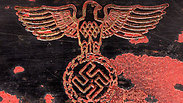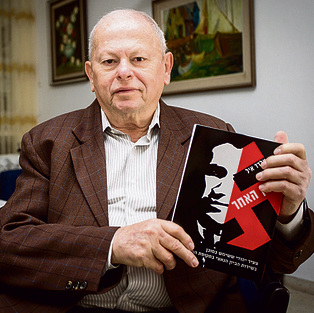
Illustration
צילום: Alexander Historical Auctions
The Jew who spied for the Nazis
Journalist and author Eldad Eyal reveals in his book the painful truth about his family: his uncle was forced to aid the Nazis in exterminating the Jews in Romania, fled to Brazil after WWII and spent the rest of his life in hiding, isolated from everyone he cared for.
Eldad Eyal was always excited to hear tales of his uncle, Moritz Rothenstein, who lived in Brazil. His uncle was always described as introverted, someone who tends to raise more questions about him than most.
Eyal took every opportunity to ask his family about his uncle Moritz, but always felt that a piece of the puzzle was missing. A few years ago, he finally found it; uncle Moritz, a scion of a respected and well-educated Romanian family, was a Nazi intelligence agent.
During the Second World War, Rothenstein aided with the extermination of Romania's Jews, and later escaped prosecution by traveling across the ocean and going into hiding.
For years Eyal, now 72, a longtime Journalist and editor, pieced together testimonies and evidence on his mysterious uncle, the result of which is a book called "The Other Aspect," which was published a day before the Holocaust Memorial Day and reveals in full detail this unique story for the first time.
"The main reason to why I didn't publish the book until now was that some of the characters in it were still alive," said Eyal. "After they passed, I realized that a fascinating story such as this must not be allowed to be forgotten.
"I feel like I did the right thing, for future generations. People need to know that a thing such as this—a Jewish spy for the Nazis—is actually possible."
Moritz Rothenstein was born and raised in the city of Galați in Eastern Romania. In the 1930s he was sent by his wealthy father to study law at the University of Paris, which he finished with excellence. With his return to Romania he moved to Bucharest, where he started working as a translator in the German embassy.
"He got the job after noticing a seemingly innocent as in the paper, he was accepted and received a lot of appreciation," said Eyal. Rothenstein's intense desire to advance in his new work place made him a perfect candidate for the Nazi regime. The fact that he was Jewish was just the cherry on top.
"For the Nazis, he was perfect. Who would think that a son to a respected Jewish family will be a Nazi spy?" At some point, Rothenstein was asked to work at the Nazi intelligence agency. What would happen should he refuse is not needed to be explained.
The Jewish youth knew that not only his life was in danger, but also the lives of his family.
Rothenstein was sent to Germany, went through an espionage course, and then sent right back to Bucharest. He then spent months within the Jewish communities in his country, usually presenting himself as a Journalist, and would gather information about key figures, amount of members, central institutions and so on.
This information was then used by the Nazis, aiding them in exterminating about 300 thousand Jews in Romanian communities. After the war, Rothenstein was smuggled in a German plane to Brazil, where he spent the rest of his life.
Eyal used his training as an IDF intelligence soldier to tell the story of his uncle's recruitment, training and mobilization. The gaps of information Eyal filled in with his logic and imagination, which makes the novel read like a thriller.
When asked about how he now lives with what he knows about his uncle, or whether he thinks the book serves as some kind of atonement for him, Eyal answered that "he was caught in that situation, he didn't chose it. He was agonized by it all, and was never even fully aware of the full extent of the harm he did.
"I can't atone what he did, and I have no interest to. Atoning is something judgmental, and I'm not going to put myself in a position to pass judgment. I can't know how I would have acted if I was in the same situation. I'm not even sure someone would have been able to act differently."
(Translated & edited by Lior Mor)











